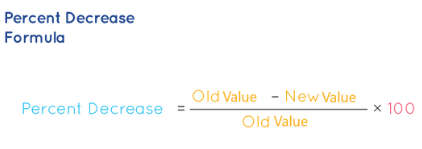Important Formula: Percentages | CSAT Preparation - UPSC PDF Download
Percentage
Percentage basically means a part per hundred. A fraction whose denominator is 100 is called a percentage .
To determine the percentage, we have to divide the value by the total value and then multiply the resultant by 100.
Percentage formula = (Value/Total value) × 100 |

It is represented by % symbol. In all the fractions where the denominator is 100 we remove the denominator and put the % sign.
Calculating percentage of a number
To calculate the percentage of a number, we need to use a different formula such as:
P% of Number = X
where X is the required percentage.
If we remove the % sign, then we need to express the above formulas as;
P/100 * Number = X

Let us understand with help of some examples.
Example: Calculate 10% of 80.
Solution: Let 10% of 80 = X10/100 * 80 = X
X = 8
Example: The number 450 is what percentage of 1200?
Solution: = (450/1200) × 100By simplifying the fraction, we get
= (3/8) × 100
= 0.375 × 100
= 37.5%
So, the number 450 is 37.5% of 1200.
Example: Convert 0.32 to percentage.
Solution: Multiplying 0.32 by 100, we get 0.32 × 100 = 32% as the answer.Example: Convert the fraction 23/25 to percentage.
Solution: Converting 23/25 to a decimal value, we get 0.92.So, 0.92 × 100 = 92% is the answer.
Percentage Increase and Decrease
(i) Percentage Increase
The percentage increase is equal to the subtraction of the original number from a new number, divided by the original number and multiplied by 100.

% increase = [(New number – Original number)/Original number] x 100
where, increase in number = New number – original number
(ii) Percentage Decrease
Similarly, a percentage decrease is equal to the subtraction of a new number from the original number, divided by the original number and multiplied by 100.

% decrease = [(Original number – New number)/Original number] x 100
Where decrease in number = Original number – New number
|
218 videos|139 docs|151 tests
|
FAQs on Important Formula: Percentages - CSAT Preparation - UPSC
| 1. How do you calculate the percentage of a number? |  |
| 2. How can you calculate percentage increase and decrease? |  |
| 3. What is the importance of understanding percentages? |  |
| 4. Can percentages be used to compare different quantities? |  |
| 5. How can percentages be helpful in budgeting and financial planning? |  |

|
Explore Courses for UPSC exam
|

|


















